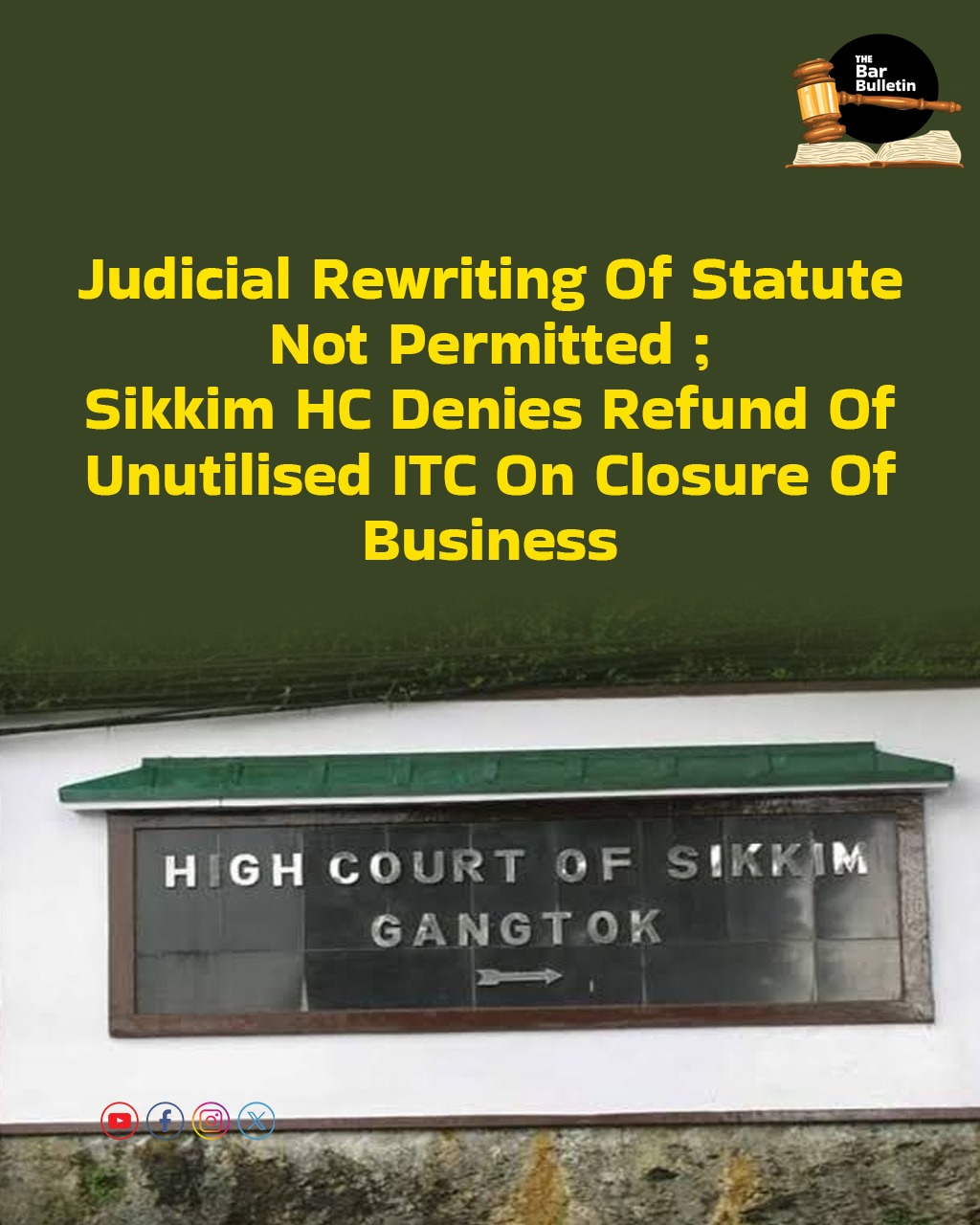The High Court of Sikkim (Gangtok Bench) has recently ruled that the refund of unutilised Input Tax Credit (ITC) on closure of business is not permissible under sections 49(6) and 54(3) of the CGST Act, as it does not fall within the two specified circumstances in the proviso to section 54(3) which bars refund of unutilized ITC unless export is made to the Special Economic Zone Units, or, the tax rate on inputs is higher than the tax rate on the output supplies.
The Division Bench comprising the Chief Justice Biswanath Somadder and Justice Bhaskar Raj Pradhan emphasized that section 49(6) merely permits a refund “in accordance with the provisions of section 54,” making it subject to the restrictions in section 54(3), and no judicial rewriting of the statute is permissible to include closure of business as a ground for refund. The Bench also noted that reversal of ITC under section 29(5) upon cancellation of registration due to discontinuation is mandatory, but the respondent has failed to prove such reversal.
The Bench went on to observe that Section 49(6) contemplates a refund only in the manner stipulated under Section 54, and it is not an independent refund-granting provision. Further, Section 54(3) restricts refunds to two circumstances: zero-rated supplies without payment of tax, or an inverted duty structure where the input tax rate exceeds the output tax rate. Since the closure of business does not qualify under the above-mentioned circumstances, thus, extending the refund would involve impermissible judicial rewriting of the statute.
Speaking for the Bench, Justice Bhaskar Raj Pradhan clarified that a refund is a statutory prescription, not a constitutional right, and the Parliament has legislative authority to define refund circumstances, and equitable considerations or perceived hardship cannot influence the interpretation of taxing statutes. Justice Pradhan also clarified that taxing statutes must be interpreted strictly based on clear language, and the Courts cannot import provisions to supply assumed deficiencies or assume hardship/inequality, when the double-negative in Section 54(3)’s proviso clearly limits refunds to specified clauses. Since there has been no violation of any Constitutional or statutory right of the respondent for which a writ could lie, the Division Bench allowed the appeal in favour of the GST Department.
Briefly, the respondent, a company engaged in manufacturing security inks and solutions in Sikkim, had claimed that no operations had been carried out since January 2019 due to the absence of orders from its customer, and accordingly, as per the RBI approval, it had discontinued the operations. During April 2019 to March 2020, the respondent sold all its machinery and manufacturing facilities and asserted that it had reversed the Input Tax Credit (ITC) as per GST provisions, and due to its closure, the respondent accumulated unutilised ITC amounting to Rs. 4.37 crores.
Later, when the respondent applied for a refund claim under section 49(6) of the CGST Act via FORM GST RFD-01 under the category ‘any other’ for unutilised ITC balance lying in the electronic ledger upon discontinuance of business, the Assistant Commissioner rejected the refund holding it untenable under sections 49(6) and 54(3), as closure of business is not covered. Instead, they opined that accumulated credit must be reversed under section 29(5), with no refund permissible under sections 49(6) and 54 of the CGST Act. Challenging the rejection of a refund, the respondent approached the High Court, where the Single Judge held that there was no express prohibition under sections 49(6), 54, and 54(3) for a refund on closure, and that the statute does not allow retention of tax without authority. Not satisfied, the GST Department appealed before the Division Bench.
Cases Relied On:
Airports Authority of India vs. Pradip Kumar Banerjee (2025) 4 SCC 111
Union of India & Others vs. Ind-SwiftLaboratories Limited (2011) 4 SCC 635
Commissioner of Sales Tax vs. Modi Sugar Mills Ltd. (1961) 12 STC 182 (SC)
Union of India vs. VKC Footsteps (India)(P) Ltd. (2022) 2 SCC 603
Appearance:
Deputy Solicitor General of India SangitaPradhan, along with Advocates Natasha Pradhan and Sittal Balmiki, for the Appellants/ Revenue
Advocates Ankit Kanodia and Passang Tshering Bhutia, for the Respondent/ Taxpayer



